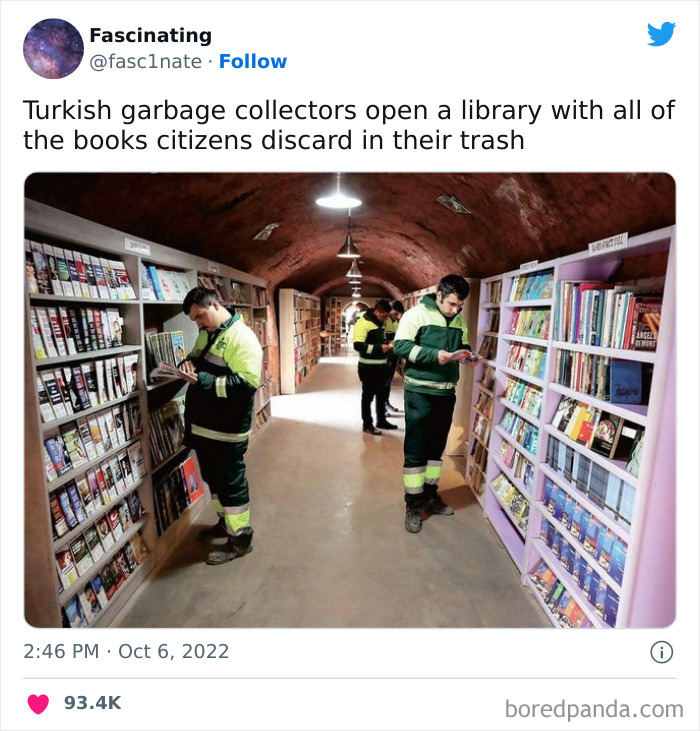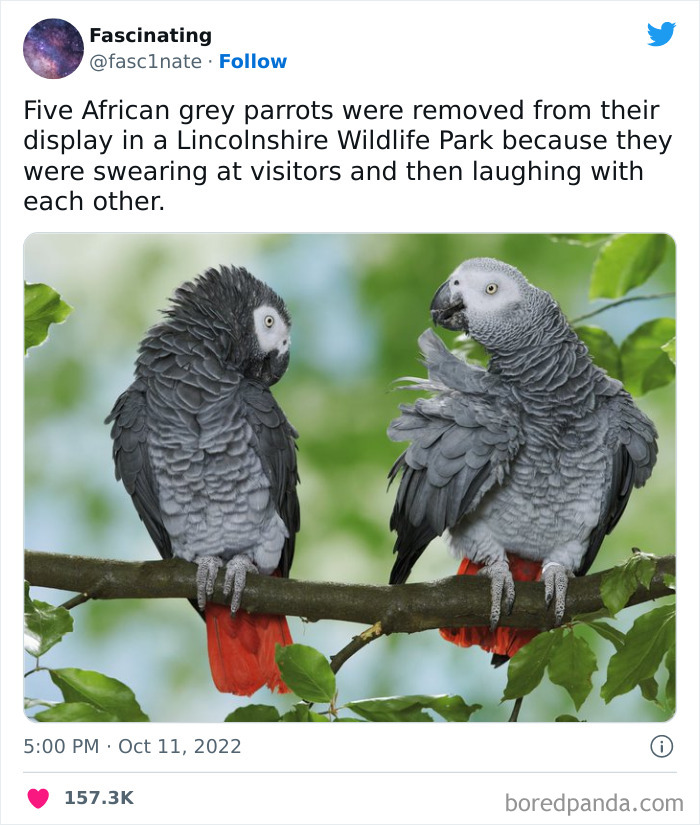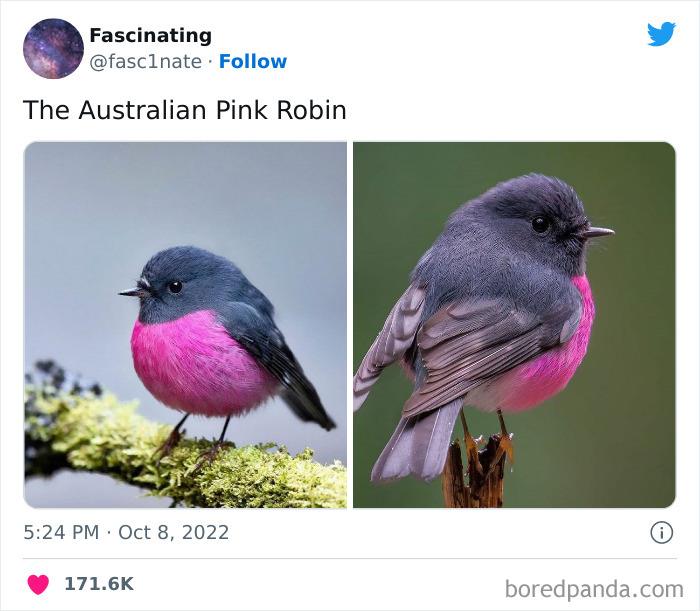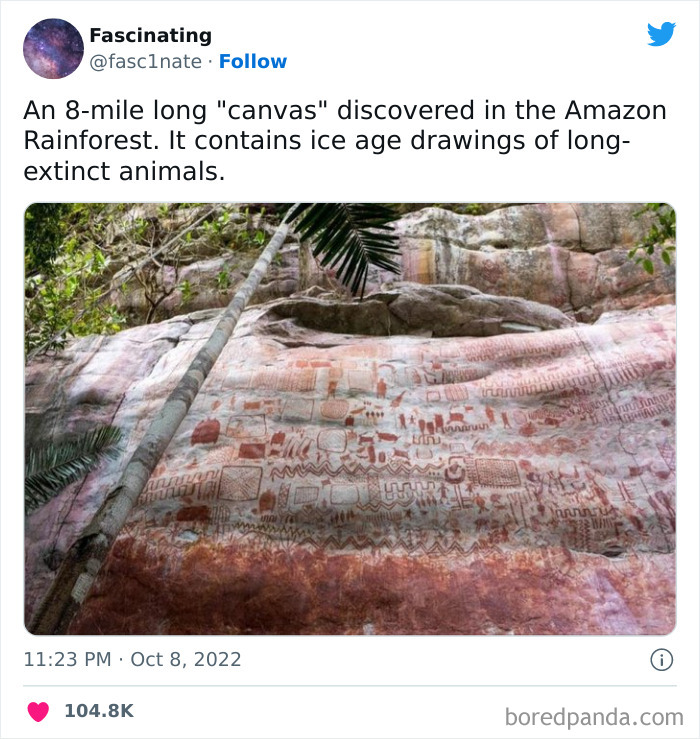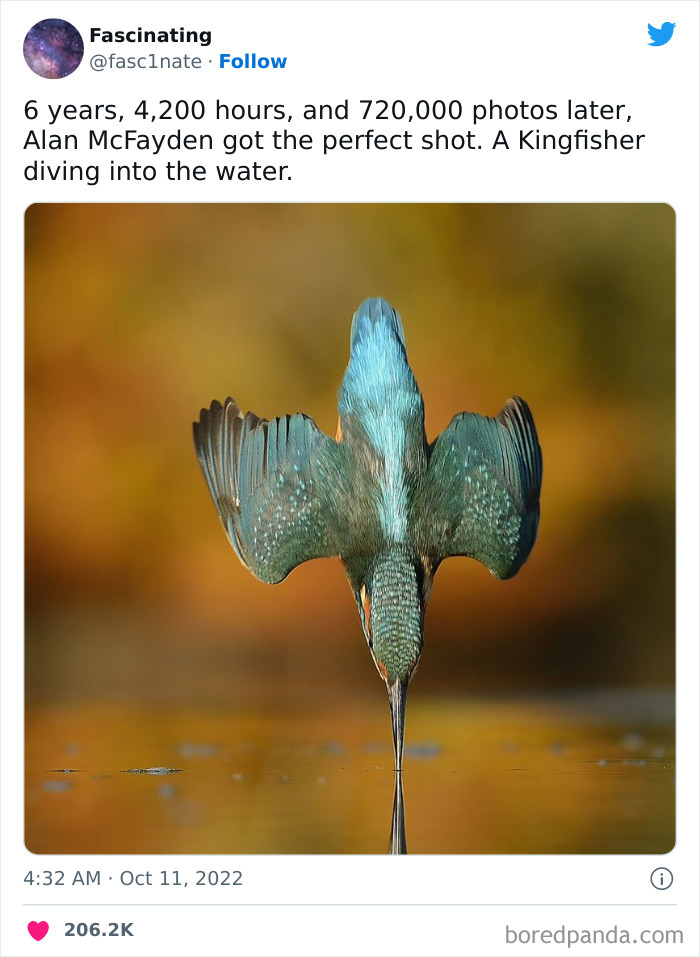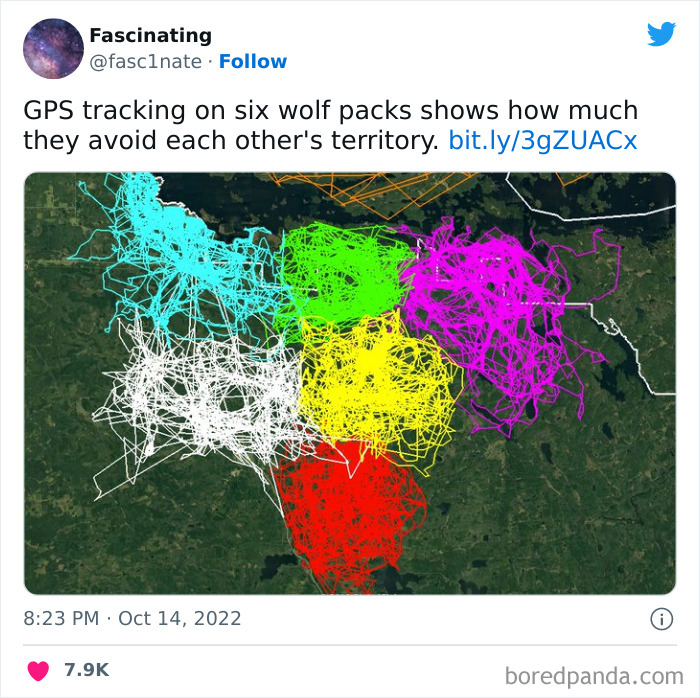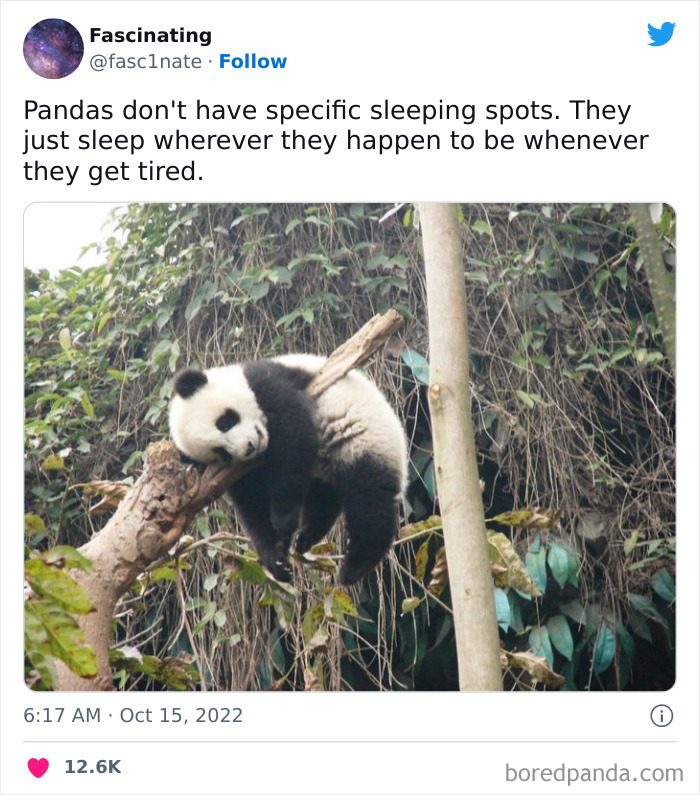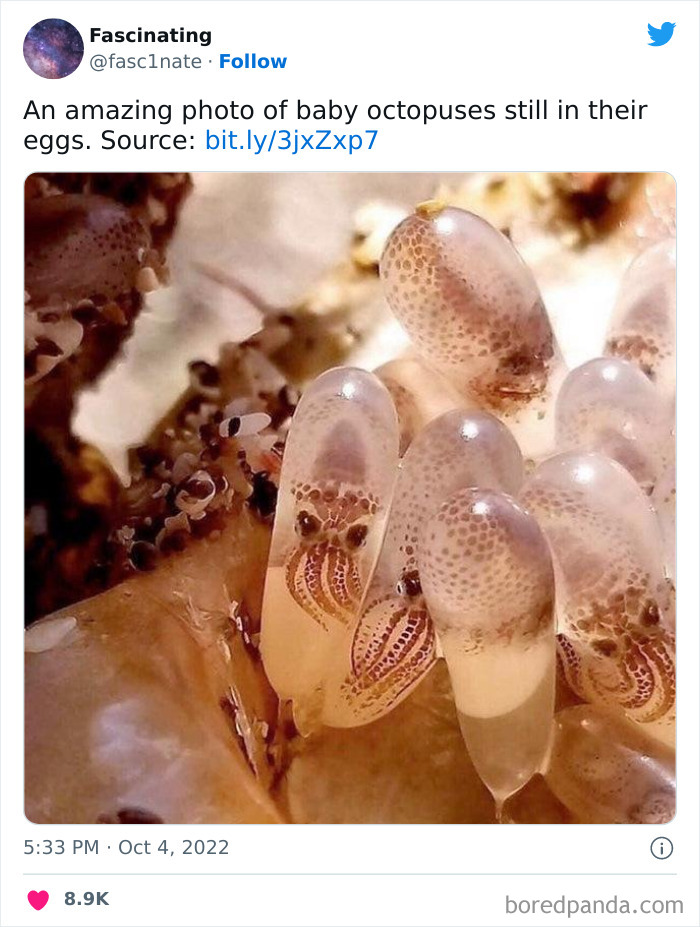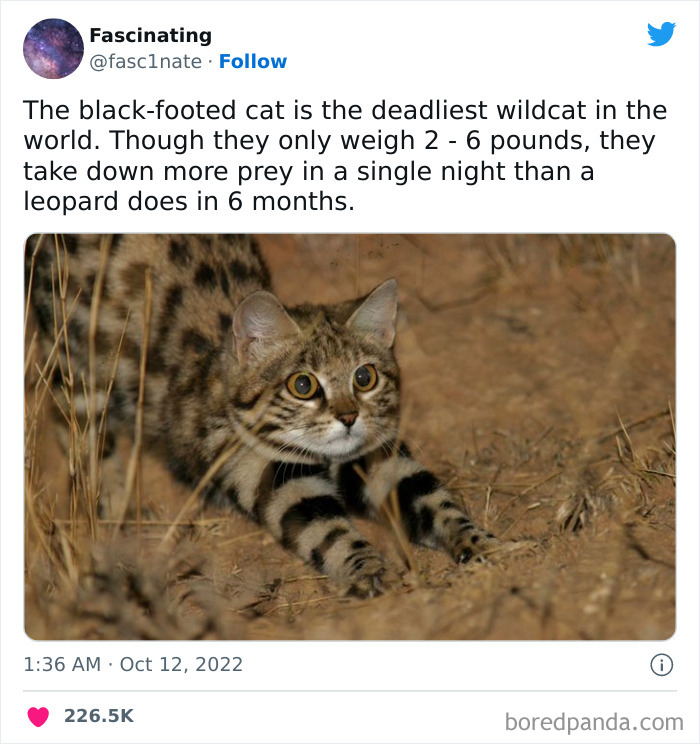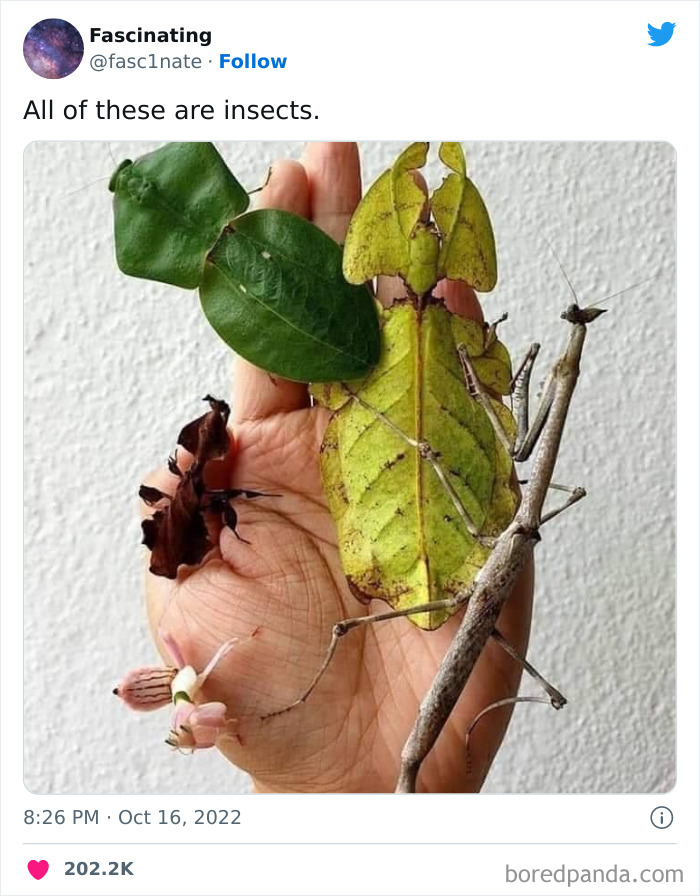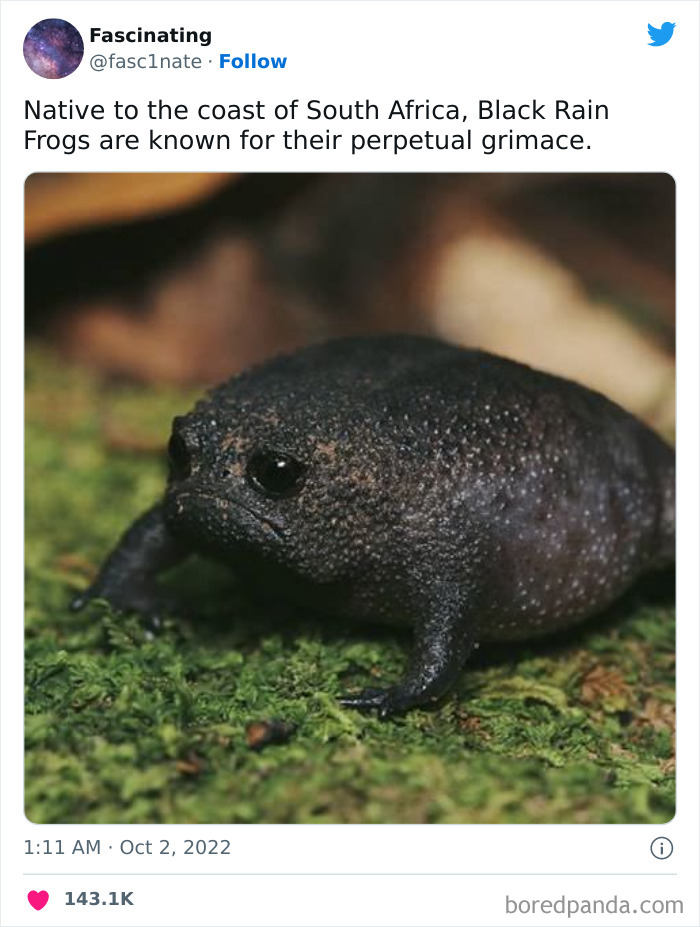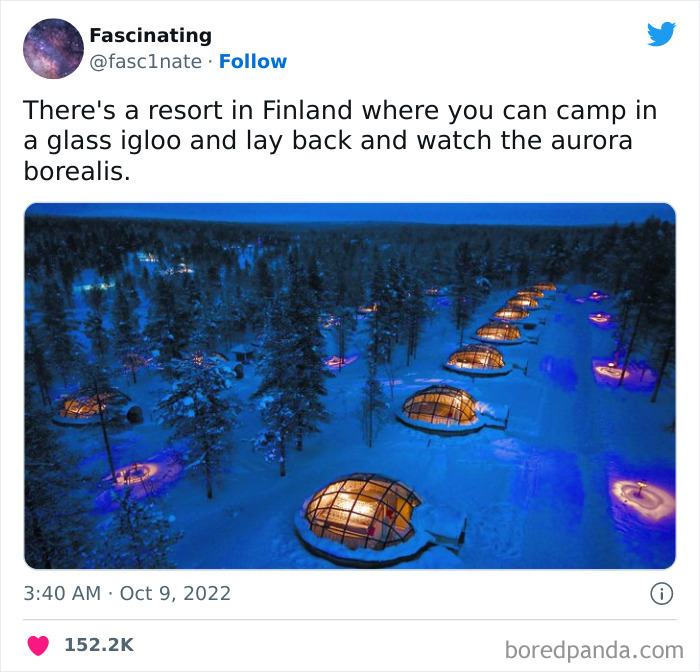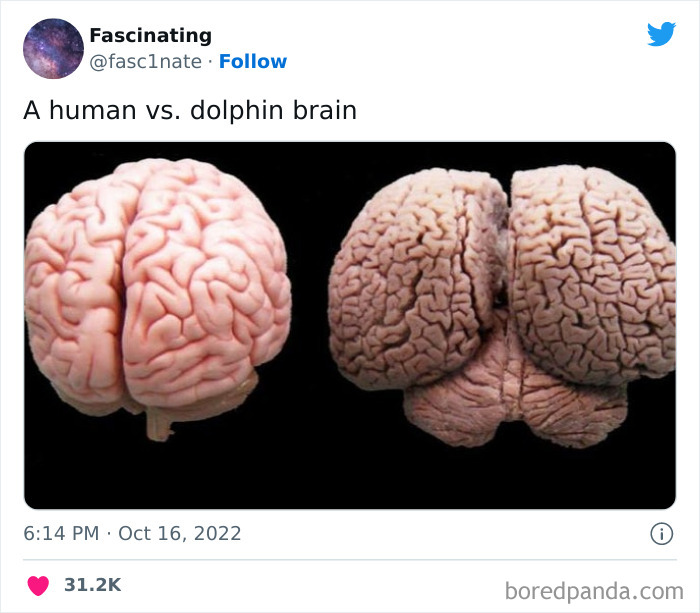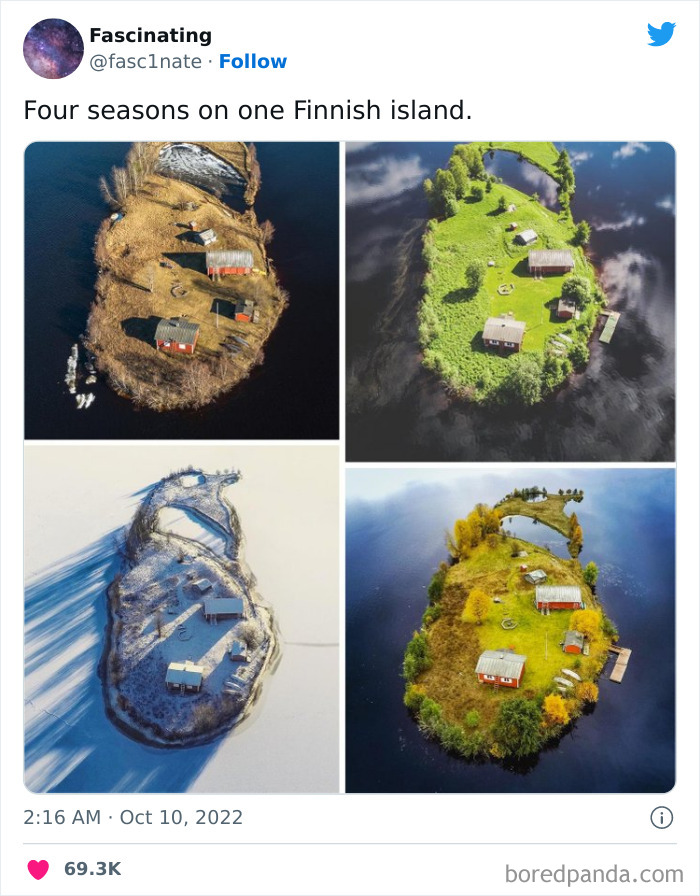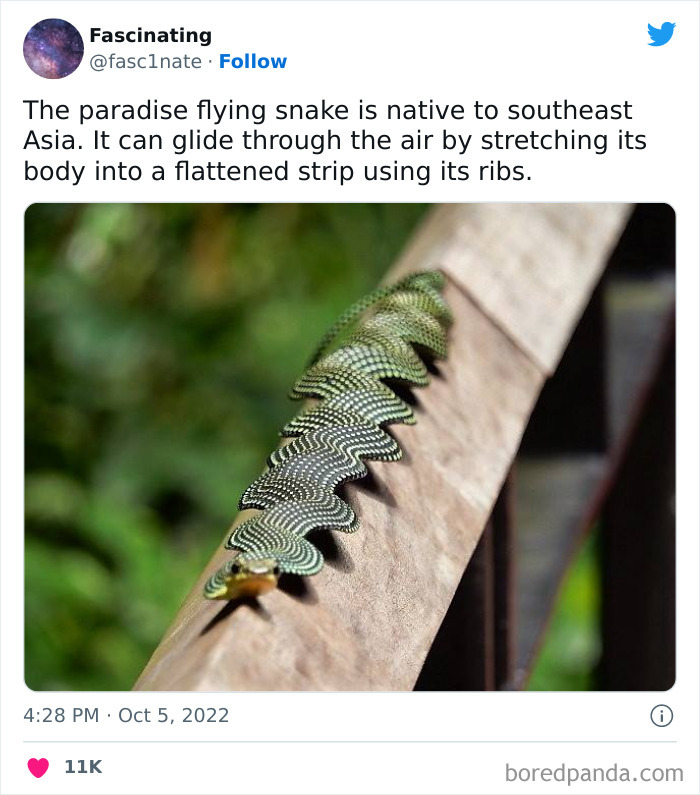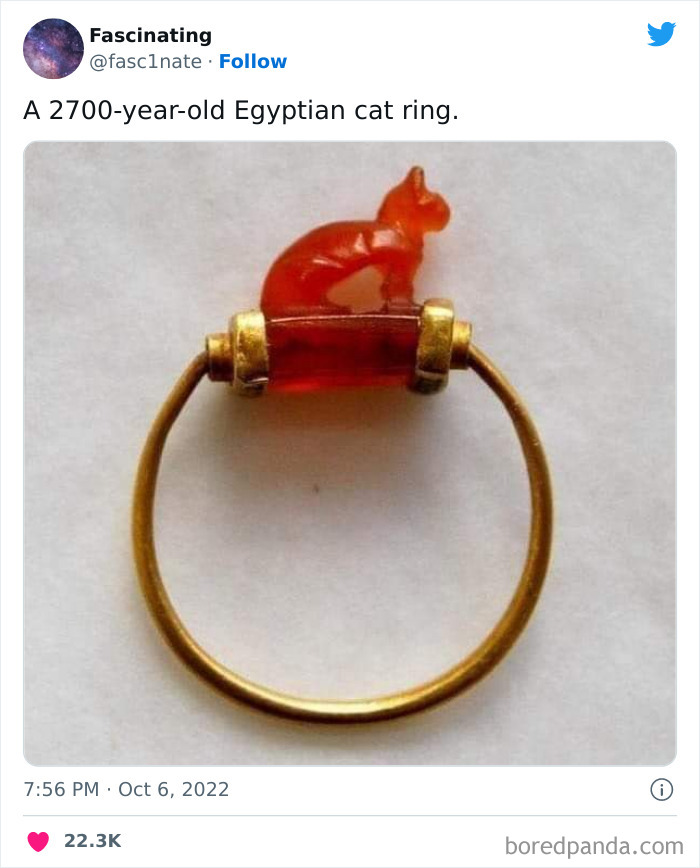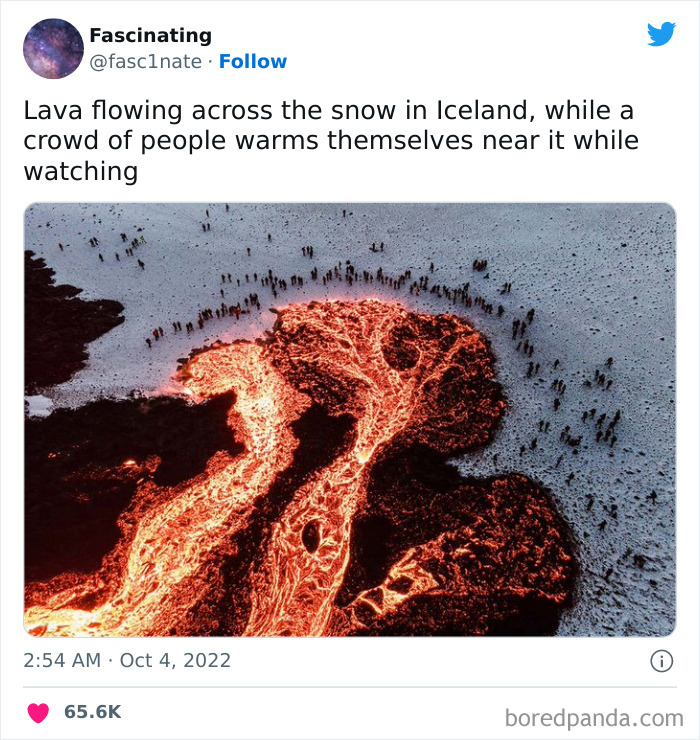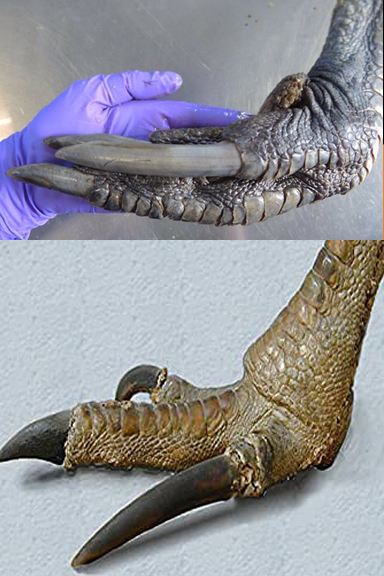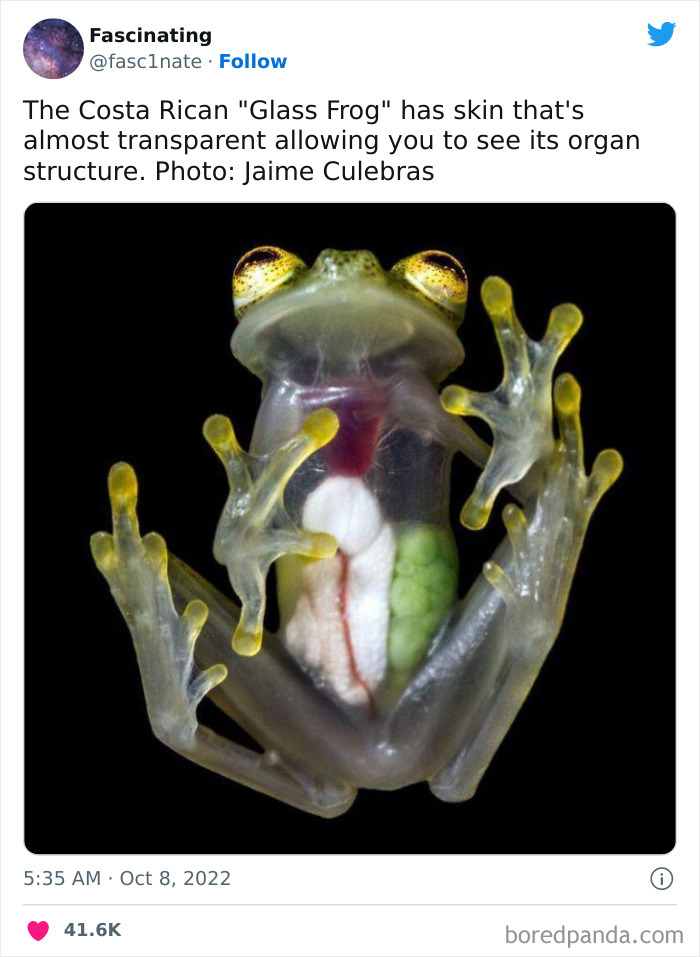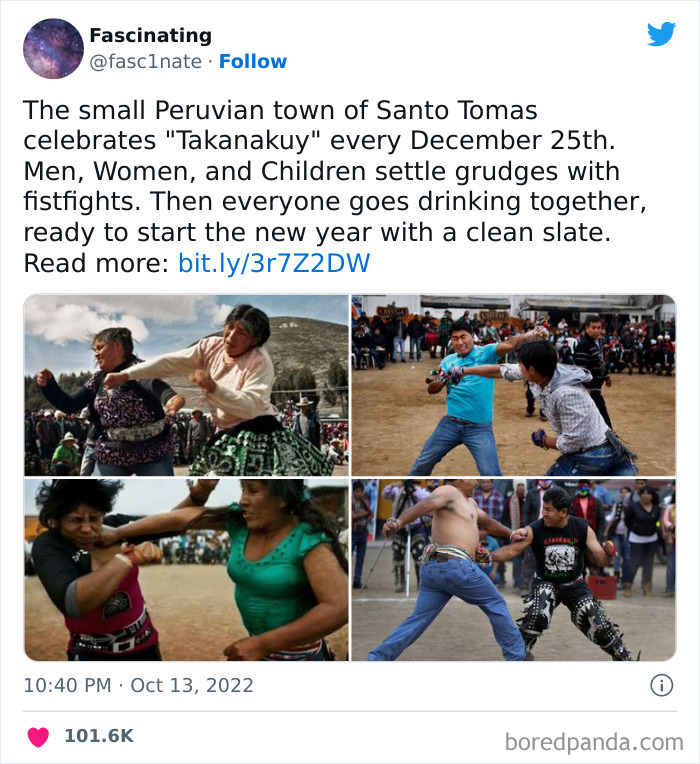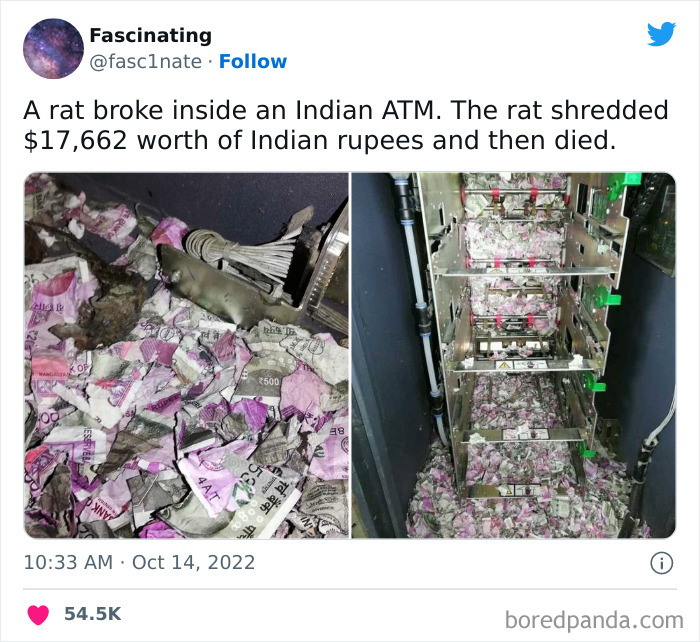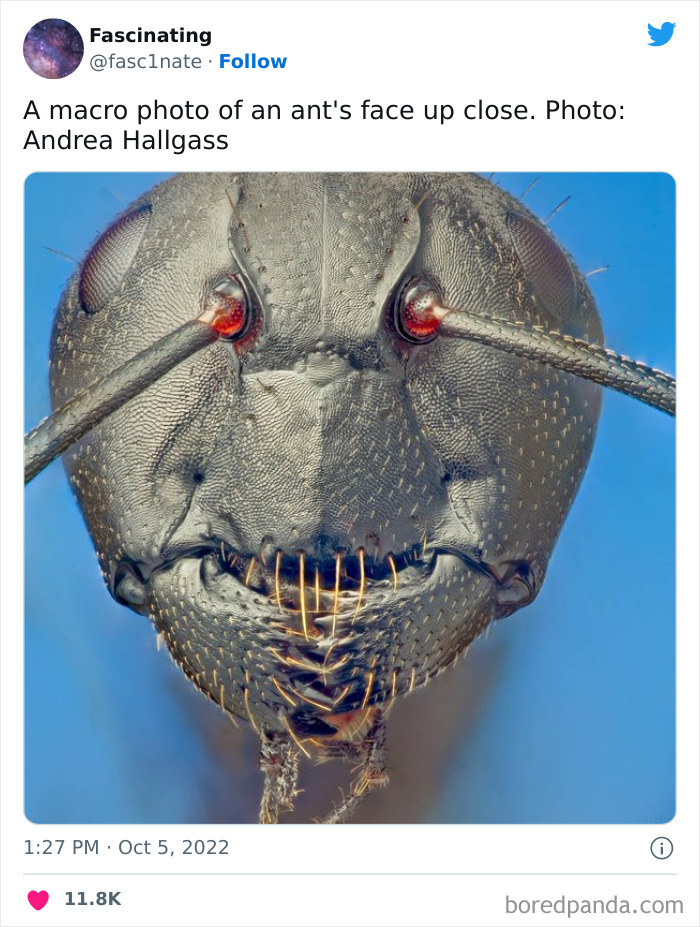
This Twitter Page Shares Interesting Facts About The World, And Here Are 45 That Might Surprise You
Infotainment has to be our favorite way to spend our coffee breaks and commutes. Equal parts informative and entertaining, it’s the kind of internet content that instantly hooks you in and doesn’t want to let go.
The next thing you know, you’ve spent the last couple of hours reading Wikipedia, jumping from articles about science and the animal kingdom to analyses of historical events and art movements. A single quality social media post can reignite your curiosity and remind you just how much fun it can be to learn new things about the world.
The popular ‘Fascinating’ Twitter page, aka @fasc1nate, is home to some pretty interesting science, history, and art facts from around the world. We’ve collected some of their coolest pics and most mind-blowing facts to share with you today. You’ll find them below, so scroll on down and upvote the pics that got your attention the most. Go on, take a break, and have some educational fun. You deserve it.
Since we're featuring a lot of posts about animals, Bored Panda decided to reach out to Dr. Suzanne MacDonald from the Department of Psychology at York University, in Toronto. Dr. MacDonald researches animal behavior, and she kindly answered our questions about people's interactions with wildlife, as well as how different species interact with one another. Read on to see what we discussed.
This post may include affiliate links.
My parents had a wisteria. The tendrils grew so fast, that one picnic, they wrapped around my chair! Must've been six loops around one of the posts!
I live in SC /US and looked into plants for my back yard patio/ fast growth Wisteria is beautiful but lots of maintenance to keep under control
Load More Replies...Its like a giant cherry blossom put together to form the king cherry blossom!
Bored Panda wanted to understand the things that people should not do when interacting with wild wildlife. Dr. MacDonald, from York University, said that the best way to deal with wild animals is "to NOT FEED THEM." If you don't follow this rule, it leads to problems that "will inevitably result in their early demise."
So remember, Pandas, no feeding the wildlife... no matter how cute the animals look. Promise?
"I think benign co-existence should be the goal," the animal behavior specialist told Bored Panda that humans and wildlife should follow a "live and let live" philosophy.
Right! The thought of throwing out a perfectly fine book give me hives.
Load More Replies...I cannot reply directly to you Pywacket, but here's a message for you: YOU are the binman, they just help clean up your mess. Try to remember that.
I always donate books that I like that I think other people should read and only trash ones I think are so bad (in my opinion) I don't want to burden anyone else with. Here's to hoping that the Turkish readers were just lazy so that these gents have a pleasant reading experience. :)
Why not donate them all? Different people like different things
Load More Replies...Folks - remember, there are millions of books in the world with more being printed every day. It's not possible to keep all of them, and we shouldn't. Go talk to a donation shop about books being thrown away.
They can be donated to schools, assisted living facilities, public libraries, orphanages, low-income neighborhoods, and impoverished countries. Books that are simply too worn out can be recycled, NOT thrown in the trash.
Load More Replies...There is only one book I ever threw away. I was about 75 pages into it and realized it was bad for my psyche and probably bad for others. I hope that one never makes it to the shelves again
That's hilarious... I'd have actually paid specifically to to experience that 😂
Maybe they could have their own space? The naughty birds section! Enter only if you want to be cussed at! Having a bad day? Let the birds tell you why you're having a bad day by cussing you out!
Okay that would be hilarious. And how did they get there cuss words?
The bird were adopted together by the park so they likely learned the curse words from the previous owner. This article from the BBC explain in a bit better: https://www.bbc.com/news/uk-england-lincolnshire-54340425
Load More Replies...they would've been the sole reason i'd even go to that park, so boooooooo!!!!
We were also interested in how animals of different species get along in the wild, and if there's a constant struggle for resources and territory. Dr. MacDonald told Bored Panda that it all depends on the species.
"Predators and their prey are locked in a constant battle. Other species, that occupy the same territory and search for the same food types (like skunks and opossums, for example), generally tolerate each other unless food is scarce, in which case they will compete," the animal behavior expert said.
it slays so much it is the queen of slay. if you are not slay around him he will slay you thats how slay he is
Load More Replies...It is Australian, so... how can it kill you? Is it poisonous? do they hunt in swarms? Do you get a cuteness-overload?
It's small enough to fly into your mouth and choke you. You have been warned.
Load More Replies...I want someday to watch all these birds. I have some blue jays in our yard and one of them got grabbed? Or attacked? The back of his head and neck are bald. They have been gone all summer. Well baldy came back the other day. He landed on our shed and started screeching at me to get him peanuts. He got his peanuts.
I refuse to believe this hasn't been caught by a kid with a pink highlighter...
Don’t be so sure! Our animals have many many ways to attack lol
Load More Replies...Nature possesses so much beauty. It's a wonderful distraction from life sometimes
Margaret, I rehab wildlife & some of them do audibly snore & squeak in their sleep.
Load More Replies...Ok I live in Oklahoma, we have some cool roadside attractions here. A VW bug painted to look like a spider that's got long legs on it... and now this. I gotta find this
Such a sensible solution to an awkward problem. Someone had their thinking cap on.
I live somewhat nearby said capsule and drive past occasionally to visit friends and family. Unfortunately I recently noticed somebody graffitied it.
Great idea! I can't imagine though that there really is no way to remove it.
Oh, there are ways. It involves a crane, a very heavy duty flatbed trailer, closing the road to get the crane in and out, a slow trip with a wide load trailer and tweeters to wherever you dispose of the thing, as it is full of set concrete. Very expensive and time consuming. On the other hand, since it is completely off the roadway and not an environmental hazard, you can declare it a giant metal encased rock, and let it sit for free very conveniently. And local humor takes over.
Load More Replies..."It is within a particular species that most competition occurs—for space, food, water, mates, territory. So for example, raccoons compete with other raccoons for all those things, and that’s where you see the most conflicts. They rarely escalate to fights-to-the-death, though, and are mostly about establishing dominance through who can make the most noise and look the most intimidating."
Created nearly a decade ago, all the way back in February 2013, the ‘Fascinating’ Twitter project has amassed over 216.5k followers in that time. The content shared resonated with a lot of people because it mixes photos that instantly grab their attention with bite-sized facts.
Their posts are a good starting point for someone hoping to look into a topic, whether it’s about animal behavior, plants, ancient archeology, or anthropology. We feel that as long as you’re interested in the world and learning something new, life continues to be a lot of fun.
Science tells us what can be done, the arts explain why it might not be such a great idea.
Load More Replies...Oh, this is just swell - Jurassic plants. Just what we need. Just what we freaking need! (I'm joking- this is actually pretty cool).
I really don't get why their is so much negativity about this , I think it's great .
There is a gigantic ambulatory plant outside my door trying to break it down. Please send help.
It's always amazing to me to see that our ancestors, just like ourselves, wanted to share their life and leave some kind of legacy about themselves behind. We all can be proud to be daughters and sons of those who came before us
And we can all be ashamed of the trash we left behind, which will become our legacy 😔
Load More Replies...I recommend that fascinating Colombian movie if you want to dive further into that topic : https://www.youtube.com/watch?v=31pfdpYLaCw
And when it is eventually translated, we will discover that it says Braxton loves Tina
Load More Replies...It interesting that artist and scientist both have decided that the people drawing those cave paintings were the geniuses of their time.
The world needs a Link to this..! we need to be able to see it if only in picture form..!
Even though kingfishers are native to my local area, I've never managed to see one in real life, so good on Alan McFadyen .
I've seen them down by the small stream near to my house, but never as more than a blue flash; those buggers are fast.
Load More Replies...That's quite a niche-hobby! I like birds. This specific kind of bird, yes. Oh, and I also like to photograph. Wildlife photography. Diving birds, especially. This is my hobby: photographing a diving kingfisher. That specifically is my hobby. Yes.
I'm 60 years old. I've lived in the UK 'countryside' most of my life. I've seen a Kingfisher (they deserve a capital 'K' IMO) just once in my life, about 40 years ago, as a flash of brilliant colour out of the corner of my eye, followed by a splash into a nearby stream. So yes, difficult to capture on film.
I wonder what the shutter-speed was on the camera he was using to get a picture like that with ZERO motion blur. I'm beyond impressed.
I can't even imagine how hard it would be to get the focus right on something that fast and unpredictable!
As someone who bird watches as a hobby this is INSANE. I've seen kingfishers sitting in trees but they're so fast in flight that they're just a blur. The amount of dedication is beyond even the most dedicated out there. I physically cannot comprehend this
However, just because something’s posted online, has a pretty picture attached to it, and has gone viral, doesn’t automatically make it the truth. Part of living in the 2020s and navigating the digital landscape means that media and internet literacy should be given more attention. In short, this means checking the reliability of the source and verifying facts before pressing the like and share buttons on whatever social media platform you use the most often.
Many cool facts really do end up being true. However, social media also means that misinformation can (be) spread quickly, too. Whether intentionally or completely by accident.
Recently, Bored Panda had a chat about verifying the reliability of information with scientist Steven Wooding, a member of the Institute of Physics in the UK and part of the Omni Calculator team.
“If a claim comes from a single source (whether it is an authority figure or not), you have to be quite skeptical,” he told us.
Flowering plants, including most "broadleaf" trees (angiosperms) date back only about 130 million years. Ginkgos look like broadleaf trees, but have been around for 190 million years, and their family of trees have been around for about 300 million years. (For much of the era of the dinosaurs, the trees were conifers and cycads, which sorta look like palm trees.)
Serious question, can't all trees live pretty much indefinitely under the right conditions?
I think trees do die of old age, but it's very rare because that tree usually dies of something else before they get old enough to die of old age.
Load More Replies...They also lose all of their leaves within a couple of days, which is why it has that huge pile of leaves there.
I hope it's not a female gingko, the seeds smell like vomit. College I went to had a bunch on one street.
We had one on my college campus. Made the whole place smell
Load More Replies...and the leaves aren't, they are actually modified needles!! they are one of the oldest kind of trees, unchanged for 200,000 years!? there are male and female trees, and you can collect the stinky fruit. and roast the kernels and eat. they are one of the prettiest prettiest trees..... and. make fantastic street trees as they live long and can tolerate the pollution better than some
Genuine question; should I read warrior cats? I had the hardest time getting into it but the community seems amazing. Edit: I seemed to have summoned the entire of both the WoF and Warrior Cats community lmao
Load More Replies...I feel like he is the village...idiot...he got lost.
Load More Replies..."Oh no it seems as though I've accidentally entered Reginald's territory. Oh dear me, I'll leave a piece of elk as an apology. Wonderful chap Reginald".
I'm thinking some youngster in the white pack is sneaking off for unapproved hanky panky, soliciting for a partner to start a new pack.
Load More Replies...I think I see some PINK ones where the read and white territories touch. Could it be the House of Lancaster, and The House of York found some common ground?
If wolves had their own Olympics, this would probably be their logo.
I absolutely agree with you! It's also insane how much the wings look like cobras.
Load More Replies...I've just noticed how animals with markings that resemble other animals - the designs look like AI art.
Yeah and twig insects break my brain too. I mean what level of cellular intelligence makes this type of intelligent defence possible?
Load More Replies...Now that’s bad a**! (Unless there aren’t actually any cobras where they live so birds don’t know to fear)
“Even if there are loads [of independent sources], they may have gotten locked into a 'groupthink' situation, and the claim is actually false. We should never have blind faith in authority figures. There is always a chance they could be wrong,” he explained that far from everything that we see, read, and hear is true.
Experimental bias and cherry-picking results are some of the most common ways that authority figures might mislead others.
My toddler sons would do this. When their bodies said “sleep”, they slept any where. We have a picture of my youngest who fell asleep at the dinner table with french fries still in his hand.
Load More Replies...I think we should all do this. Walking at the mall. Take a nap. Hanging out at the bowling alley. Take a nap. Just not while driving.
Are You actually affiliated with bored panda or are you just using that logo and name fo attention?
Load More Replies...Octopi are actually very sweet, gentle, and intelligent creatures. They are likely more scared of us they we are of them.
Load More Replies..."Often you just need to look at who funded the research. It's not surprising that (in the past at least) research funded by a maker of cigarettes said that their product was safe," the scientist told us.
While skepticism is important, too much of it can be detrimental to scientific efforts and progress. There has to be a reasonable balance between outright skepticism and blind faith in authority figures.
What !!! This lil poppet, ill just pick this up for some snoogly snuggles , cmere my lil pet...aaaargghhhh .....aaauuurrggghhh... my face!!!! Arrrgghhhhhh
I'd imagine mice and other small prey are far more abundant than the like of deer/antelope or whatever leopards eat though
The larger green one is literally called giant leaf insect, moving clockwise the next is called walking stick, bottom left is an orchid mantis, and I'm not sure about the other two. Hope someone can tell me what they are.
hard to tell with the lighting. It's possible that the brown one is a dead leaf mantis. The other one I believe is called a tropical shield mantis. Not an entomologist, but lepidoptera and mantids are an interest of mine. I think it comes with the birding territory. Actually, my favorite leaf bug is the Indian Leaf Butterfly.
Load More Replies...If I’m thinking of the same story - when Cheddar Man was discovered, the teacher actually got some of his students to volunteer to test their DNA along with himself to see if anyone shared ancestry with Cheddar Man. Turned out he did but none of his students did, must have been so exciting :) “hey students let’s find out who’s maybe related to this guy! Oh, it’s me!”
Load More Replies..."So apparently I've just inherited this cave from some old relative..."
OMG! Please let that be true. I need this to be true to restore my faith in humanity.
Load More Replies..."If the public were very skeptical, science would be hindered, and progress slowed. In areas such as healthcare and technology, science is delivering for people and making a difference in their everyday lives," the scientist told Bored Panda.
"In the past few decades, [faith in the scientific community] has probably increased. Climate change is now more widely accepted than ever before now that its effects are clear to see. And science has got the world through the recent pandemic with innovative vaccines, anti-viral drugs, and data science,” he said.
Probably thinking "OK nowwww it's cold, chill out weather.."
Load More Replies...At first, I thought this was some sort of dragon made of water coming out of the ocean 😅
I thought I was a dumbass and bison was a name for some sort of frozen geyser or something. Until I looked a 3rd time
My brother would make them nice and warm - ON A GRILL.
Load More Replies...Wonderful metaphor! Upvoting you for literary achievement!
Load More Replies...If you want to watch an adorable video of this little guy: https://www.youtube.com/watch?v=HBxn56l9WcU
Load More Replies...I wonder how she feels about her successor...
Load More Replies...This will confuse the hell out of future archaeologist: what was Fred doing there?
"I'm sorry, Fred - there was a lot of anti alien prejudice back then. It was a different time."
Load More Replies...In the cathedral of Salamanca, the stonemasons who restored it added an astronaut
There is also a wonderful little gargoyle of a horned dragon eating an ice cream cone. Gargoyle_i...43a2b4.jpg 
Washington National Cathedral (Washington, DC, USA) has a Darth Vader gargoyle.
Is it a Gargoyle or a Grotesque? In other words is it an ornamental waterspout (Gargoyle) or not?
A while back, Lee McIntryre, from Boston University, spoke to us about media literacy. He pointed out that just because a fact or claim is constantly repeated doesn’t make it true.
"Repetition is important in making us believe things, whether they are true or not. There is a cognitive bias called the 'illusory truth effect' which is when we are repeatedly exposed to false information over and over and, over time, it begins to seem more plausible," he said.
Arctic SnowHotel & Glass Igloos - Lehtoahontie 27, 97220 Sinettä, Finland is one. There are several resorts in the area
Load More Replies...😧😧😧I so wish I had money to go there!!! Aw hell I wish I had money to go anywhere! 🥺
Saw this picture on my news app, it's been photoshopped. Those are not the natural colors.
https://misbar.com/en/factcheck/2022/08/24/viral-photo-of-a-salt-mountain-in-iran-is-edited
Load More Replies...Non- photoshopped version: https://www.facebook.com/Antolini.Luigi/photos/a.1413654622186166/2912902065594740/?paipv=0&eav=AfY2QVvGp01MqduUYIUg3owdxmYKY9H56O4uY8VQUymfb5y5Ts_MLqNAgNBxbV-XGp0&_rdr
The saturation has been ramped up, to make the colours more extreme.
Lightning strikes planes all the time, usually having no effect on the plane’s functions and systems. No people are harmed either since the lightning stays on the metallic outside. At most, the plane’s paint gets a scorch mark, but other than that, it really isn’t dangerous.
Load More Replies...Looks like the plane actually broke or severed the lightning bolt.
The lightening bolt travelled through the metal skin of the plane and on to the ground.
Load More Replies...Möbius, as in August Ferdinand Möbius, the German mathematician & astronomer who theorized turning a 2 dimensional membrane into a 1 dimensional one while in 3 dimensional spacetime. He also taught Harry Keogh how to teleport using said mathematics.
Load More Replies..."Social psychologists have known since the 1960s that repetition works, for truth or falsity. In fact, this idea goes back to Plato who said that it didn't hurt to repeat a true thing,” the expert said, warning that some might use this effect as a way to spread propaganda, as they have in the past century to horrible effect.
Even well-educated individuals aren’t immune to making mistakes. For instance, someone might intellectually understand how the illusory truth effect works and how repetition ties into it. However, in real life, they might fall victim to it without even realizing it. Cognitive biases are an ever-present danger, even if we understand them.
Lol! Geordi LaForge was not an Inuit! (I mean, he tried it once, but he's just not Inuit.)
Load More Replies...This highlights that there were people groups living in areas that were not at all conducive to human habitation without impressive effort. Why they originally migrated to those areas and why they stayed are fascinating questions.
It's always nice to know the inuits from 2,000 years ago had more swag than me...
I imagine early glasses for distance would be similarly constructed, however this is spectacular!
Either Hyperion has hyperactive growth hormones, or it was the lone survivor of an ancient wildfire, and everything else around it is new growth (in comparison). Arborists/Botanists are welcome to let me know why it’s so much taller than the surrounding forest.
Sites online disagree on whether it is genes, the climate, or some water. Hyperion is estimated to be 600 - 800 years old, so, therefore, an ancient wildfire might be possible. But it is likely that Hyperion has a case of polyploidy if someone were to examine its genes. Polyploidy is a case where there are more chromosomes than normal (like down syndrome or trisomy 13), but polyploidy really benefits plants. I can't find anything anywhere online though . . . it appears that besides hiding the place where the tree is, they hid all info.
Load More Replies...„How high does the sycamore grow? If you cut it down, then you'll never know“
The swamp gum, or Australian mountain ash (Eucalyptus regnans, family Myrtaceae), is an unrelated species native to southeastern Australia. The tree can reach heights over 114 metres (375 feet) and is the tallest angiosperm (flowering plant) species
Thank you eMpTy, i was going to say the same thing 👍😎
Load More Replies...How long is it going to be before some bright spark decides to cut it down?
They’re clearly more intelligent than ourselves. And that split, it’s so dolphins never have to sleep. One side of the brain sleeps, while the other is active and vice versa
Even though we are unconscious for effectively 1/3'of our lives can one ever think of a life where you don't sleep? It's a hard concert for humans to comprehend. There would be no break in life no time to reboot, no phases. Yikes
Load More Replies...HEY - we said the same thing. Douglas would be proud,
Load More Replies...intelligence is based on brain size compared to body mass, humans have very large brains compared to the size of their bodies, dolphins have large brains compared to their bodies too, but when comparing the two the human brain to body ratio is much larger. however most other animals do not come close to the brain/body ratio of dolphins even
Size doesn't really matter...It's all about the number of neurons a connections in the brain! A elephant's brain is double the size and has 6 billions neurons, whereas a human has about 16 billion :) but no doubt dolphins are really smart
Elephants are really smart too! They make life long relationships and care about others.
Load More Replies..."It would be exhausting to fact-check every single news item we hear. In fact, insisting on this degree of skepticism is something that demagogues use to get us to be cynical, because when we doubt that it is possible to know the truth—even when it is staring us in the face—we are riper to their manipulation. So I'd say the best thing with news is to do a little investigation into finding a reliable source," Lee told Bored Panda.
"Look for an organization that does investigative journalism (and doesn't just repeat information from other sources), double sources its quotations, discloses conflicts of interest, etc. Once we've found that we can relax a bit and trust the reporting behind the stories. Do we still need to be on guard? Yes. Even The New York Times can make mistakes. Or individual reporters can have biases. But that doesn't mean 'all sources are equal.'"
What I wouldn't give to live there. Just have stuff delivered twice a month.
When thanos strikes with his infinity gauntlet @heidi hunt
Load More Replies...Mwhahahaha . . . only now do you understand the power of the dark side!
this pic reminds me of "forest" by system of a down. it's kinda heavy if that's not ur vibe but give it a listen it's epic
Good grief. Imagine the “fallout” from this number of birds flying over. (The poop. I’m talking about the bird poop, for those who didn’t get it.)
The most fascinating thing about this movement of birds at sunset on the sky of Rome is that the shapes they create in the air and the way they change it were the source of inspiration for a research by physicist Giorgio Parisi (born Roman and working there, so of course very familiar with this), who won Nobel Prize in 2021 ❤
Some of the questions we need to ask when considering any claim or source include: “Is the story copyrighted? Is it dated? Is there a byline? Are other stories by the author solid? Is it published in a source that has been reliable in the past? Does it seem plausible—if not then you can do some research," Lee explained.
"Will we get fooled sometimes in doing this? Yes. But we're going to get fooled sometimes anyway. It's analogous to how scientists form their beliefs. They are skeptics, but they also—at some point when the evidence is sufficient—give their assent. Scientists deal with warrant, not 'proof.' They are what philosophers call 'fallibilists.' You give your belief to things that are well-sourced with evidence, while always holding out the possibility that if further evidence comes to light that contradicts your belief, you should give it up because you might be wrong."
This has now been added to my ever increasing bucket list.
It IS beautiful. But I bet it's very frightening during a windy rain/snow storm!
Hire a local as driver. They've seen it many times before. Then you can look as much as you want.
Is this the route that Clarkson et. al took in their most recent Grand Tour special, where James was a dumbass and crashed into a wall that was part of the underground naval base?
Affenpinscher? How rare, for me anyway! I have one too! Rescued 6 years ago, best lil caregiver (and lizard hunter) ever. <3
Load More Replies...This place is close to the Maryland state line near Cumberland. Also very close to The Eastern Continental Divide. I can remember that the sign for it says that the elevation is at almost 3300ft on the mountain. It was raining before we started up the mountains and snowing on top. It was really beautiful in this area of West Virginia and Maryland.
Why does it seem that all wildlife in the Asian and Australian continents are horror film level of absolutely terrifying and/or deadly.
Because they are? Keeps most of the riff raff out of Australia 😁
Load More Replies...Wait until you see one moving straight forward with straight body and no lateral undulation. Apparently they use their scales to do it and it's done when hunting as it's very quiet. I'm not normally scared of snakes but it was really chilling to see! I had no idea they could do such a thing.
Load More Replies...They are virtually harmless to humans even though they are venomous. They are a rear fanged species whose fangs are teeny tiny.
I truly did not need to know that some can fly 😩🐍 That’s going to add a whole new element of horror to my nightmares. Thanks BP!
They can't fly. They glide by leaping from a taller tree to a lower one.
Load More Replies...Cats were considered divine in ancient egypt so that ring was to them like cross rings, or other cross jevelry to us.
I would love to know the real and factual reason the Egyptians paid such tribute to cats... if I had a time machine and a translator, I would investigate. I also love cats.
Possibly, cats killed the rodents that ate the grains that they stored to feed their community. I've spent some time thinking about this :-)
Load More Replies...'the floor is Lava, IG'... I always thought that if you were that close to Lava the fumes would kill you...
No pyroclastic flow otherwise they'd have been dead hours ago, lava itself is slow, so just keep moving.
Load More Replies...Excuse me but are those little black specks I see down there people? Yep, the bigger brain definitely belonged to the dolphin.
And don't give that - "and then engineers came bulls**t", there's no sign huge vehicle traffic in this... hahaha
Also why the heck do people think Romans did not have engineers? Do they think it was built without plans and designs, through some intuitive, inborn ability?
Load More Replies...I live on the Watling Street, a Roman road in England that runs from Dover west-northwest to London and thence northwest via St. Albans (Verulamium) to Wroxeter (Ouirokónion, or Viroconium). It was one of Britain's greatest arterial roads of the Roman and post-Roman periods.
I wish i could see it, I'm imagining an amazing quaint row homes, or flats, in an old part of the city with lots of wrought iron and flower window boxes.
Load More Replies...Parts of the Cloaca Maxima (sewer) in Rome, built over 2000 years ago, are still in use today.
The Appian Way is one of the earliest and strategically most important Roman roads of the ancient republic. It connected Rome to Brindisi, in southeast Italy. The road is named after Appius Claudius Caecus, the Roman censor who began and completed the first section as a military road to the south in 312 BC during the Samnite Wars.
The cobblestones are a lot more recent. Likely 300 years old or so. The stones are below. I learned to ride my motorcycle over the Rome's cobblestones in the rain. Anything else is unchallenging.
It was the largest flightless bird in the world before it became extinct
Scientists are hoping to bring the giant moa back. They have almost reconstructed the entire genome because of how recently they went extinct. https://www.scientificamerican.com/article/scientists-have-reconstructed-the-genome-of-a-bird-extinct-for-700-years/
Great. Something else to c**p on the car, and with devastating accuracy.
Load More Replies...Apparently humans turned them all into massive, *massive* BBQ wings.
the first instance of someone flipping someone off in history.
Stumbling upon something like that would probably trigger a full blown panic attack.
Load More Replies...Looks like it’s flipping us the bird for aiding and abetting its extinction. You just know humans had a filthy hand in it. It’s our MO.
Imagine being the child who wants to raise alpacas rather than carry on the family business.
"Yeah, that's cute, here's the room key board"
Load More Replies...No more dissecting frogs in Biology class. Just put this guy on his back & watch how his guts work.
That would be so cool, collages could keep one or two and they'd be class pets and save other frogs lives by replacing dissections.
Load More Replies...Unless there is beer and singing afterwards, it usually just perpetuates the problem. "She didn't say hello to me" becomes "She broke my nose"
Load More Replies...This is how the UN should function.... No wars ,just drunken fist fights between world leaders.....
I’d watch it. Put on a streaming service and the money brought in replaces taxes in the local area. There’s be enough to build schools, hospitals and libraries damn near everywhere on the planet.
Load More Replies...I had a collegue, we didn't get along much. Then we had a fight. Best friends after that...
Load More Replies...A Festivus tradition, includes the Airing of Grievences! Frank Costanzas legend lives on!
"When the last tree has been cut down, the last river poisoned, and the last fish caught, only then will man realize that money cannot be eaten".
Er, no. They already did the conversion. It says 17,662 dollars worth of rupees. So, at your exchange rate, the rat shredded 1,430,946 rupees, probably either for nest material or because it was trapped and loiking for a way out.
Load More Replies...A pharyngeal jaw is a jaw within a jaw, like the Xenomorph from the film Alien. This Dogfishes jaw juts out like the Deacon from the film Prometheus. prometheus...79c426.jpg 
Think about this: That asteroid was traveling, almost certainly for somewhere around *rough estimate* probably about 500 Million to 2-3 billion years (best estimate I can come up with based on what we know about asteroids) before it got locked into our part of this spiral arm of our Milky Way Galaxy, before somehow meandering into our specific star system, avoided being sucked into a bunch of MUCH MORE MASSIVE ASTEROID EATING PLANETS in our solar system, got into earth's gravitational pull, circled inward to meet it directly in it's extremely narrow orbital path (the earth is TINY compared to the solar system as a whole, not to mention the visible universe) and it came down exactly in the country, then town/city, then neighborhood, then block, then house/area, then hit this lady directly in a part of her teeny tiny body (compared to the scale of the universe). The most lucky AND unlucky woman in the world simultaneously.
Keep an eye on all the phone booths in her neighborhood. (And in 1954 they actually had phone booths!)
Load More Replies...“Docs in Shock when Woman Hocks Space Rock that Cleaned Her Clock”
luckily it when through hear roof and hit something and bouncing of and hitting her or the result would have been way more dangerous
It's eyes almost look like high tech auto speaker covers and it's mouth looks like it's been loosely stitched shut. The antennas look like they've been melted into place and the head looks like leather covered armor plating. Really very dystopian.
Surely they're 'in-lines' if anything? (X-ray > bones > inside body?)
Load More Replies...This mommy is going to be super duper busy in a few weeks. I hope she can produce enough milk or her family can help give her babies some supplemental feedings, because I think I counted at least about 15 baby puppers in her tummy and they're going to be nursing all the time to keep that many fed. All those precious little puppy skulls, bless their mommy's heart ❤.
I'd like to thank the kind people at BP for shortening this from the exhausting 47 images to the much more manageable 45. I can't imagine how difficult it must have been for them to pair this down, so again, thank you.
They also have rituals for funerals! We have yet so much to learn about animals :)
I'd like to thank the kind people at BP for shortening this from the exhausting 47 images to the much more manageable 45. I can't imagine how difficult it must have been for them to pair this down, so again, thank you.
They also have rituals for funerals! We have yet so much to learn about animals :)

 Dark Mode
Dark Mode 

 No fees, cancel anytime
No fees, cancel anytime 








